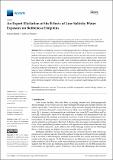Files in this item
An expert elicitation of the effects of low salinity water exposure on bottlenose dolphins
Item metadata
| dc.contributor.author | Booth, Cormac | |
| dc.contributor.author | Thomas, Leonard Joseph | |
| dc.date.accessioned | 2021-02-19T17:30:03Z | |
| dc.date.available | 2021-02-19T17:30:03Z | |
| dc.date.issued | 2021-02-14 | |
| dc.identifier | 272950641 | |
| dc.identifier | deb0b9ab-c2aa-4249-b904-d56b2379a3bc | |
| dc.identifier | 85120444334 | |
| dc.identifier.citation | Booth , C & Thomas , L J 2021 , ' An expert elicitation of the effects of low salinity water exposure on bottlenose dolphins ' , Oceans , vol. 2 , no. 1 , pp. 179-192 . https://doi.org/10.3390/oceans2010011 | en |
| dc.identifier.issn | 2673-1924 | |
| dc.identifier.other | Jisc: d34cc52b548544cc8e8d4ce7765cf650 | |
| dc.identifier.other | ORCID: /0000-0002-7436-067X/work/89178268 | |
| dc.identifier.uri | https://hdl.handle.net/10023/21461 | |
| dc.description | Funding: This research was funded by National Marine Fisheries Service for support via awards: NFFKPR00-19-01552 and NA20NMF0080281. | en |
| dc.description.abstract | There is increasing concern over anthropogenically driven changes in our oceans and seas, from a variety of stressors. Such stressors include the increased risk of storms and precipitation, offshore industries and increased coastal development which can affect the marine environment. For some coastal cetacean species, there is an increased exposure to low salinity waters which have been linked with a range of adverse health effects in bottlenose dolphins. Knowledge gaps persist regarding how different time–salinity exposures affect the health and survival of animals. In such data-poor instances, expert elicitation can be used to convert an expert’s qualitative knowledge into subjective probability distributions. The management implications of this stressor and the subjective nature of expert elicitation requires transparency; we have addressed this here, utilizing the Sheffield Elicitation Framework. The results are a series of time response scenarios to estimate time to death in bottlenose dolphins, for use when data are insufficient to estimate probabilistic summaries. This study improves our understanding of how low salinity exposure effects dolphins, guiding priorities for future research, while its outputs can be used to support coastal management on a global scale. | |
| dc.format.extent | 14 | |
| dc.format.extent | 632125 | |
| dc.language.iso | eng | |
| dc.relation.ispartof | Oceans | en |
| dc.subject | Freshwater | en |
| dc.subject | Cetacean | en |
| dc.subject | Tursiops sp. | en |
| dc.subject | Wildlife management | en |
| dc.subject | Marine biology | en |
| dc.subject | Salinity | en |
| dc.subject | Human disturbance | en |
| dc.subject | Dose response | en |
| dc.subject | QL Zoology | en |
| dc.subject | GE Environmental Sciences | en |
| dc.subject | DAS | en |
| dc.subject | SDG 14 - Life Below Water | en |
| dc.subject | MCC | en |
| dc.subject.lcc | QL | en |
| dc.subject.lcc | GE | en |
| dc.title | An expert elicitation of the effects of low salinity water exposure on bottlenose dolphins | en |
| dc.type | Journal article | en |
| dc.contributor.institution | University of St Andrews. Scottish Oceans Institute | en |
| dc.contributor.institution | University of St Andrews. Arctic Research Centre | en |
| dc.contributor.institution | University of St Andrews. Statistics | en |
| dc.contributor.institution | University of St Andrews. Centre for Research into Ecological & Environmental Modelling | en |
| dc.contributor.institution | University of St Andrews. Marine Alliance for Science & Technology Scotland | en |
| dc.identifier.doi | https://doi.org/10.3390/oceans2010011 | |
| dc.description.status | Peer reviewed | en |
This item appears in the following Collection(s)
Items in the St Andrews Research Repository are protected by copyright, with all rights reserved, unless otherwise indicated.

